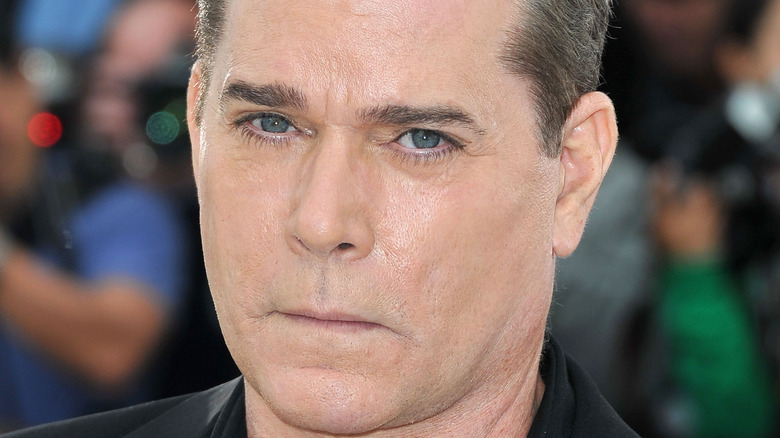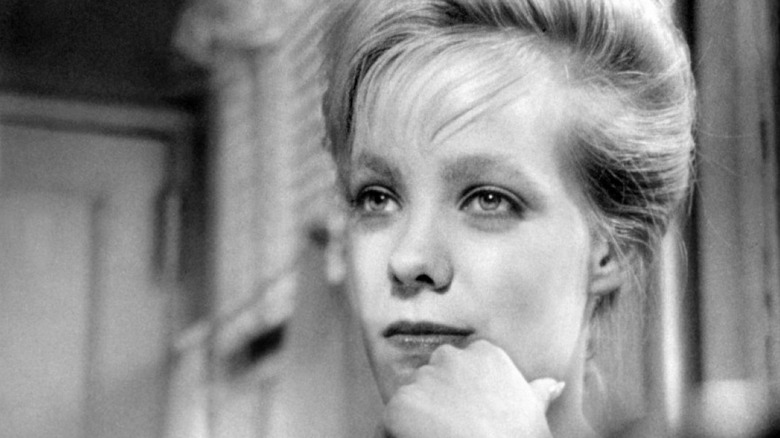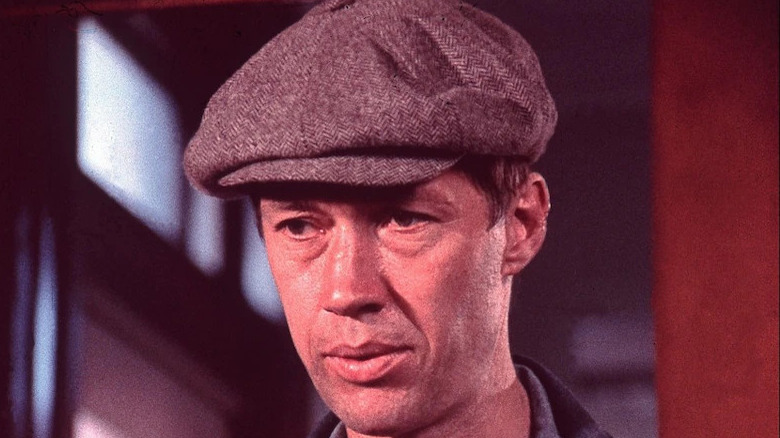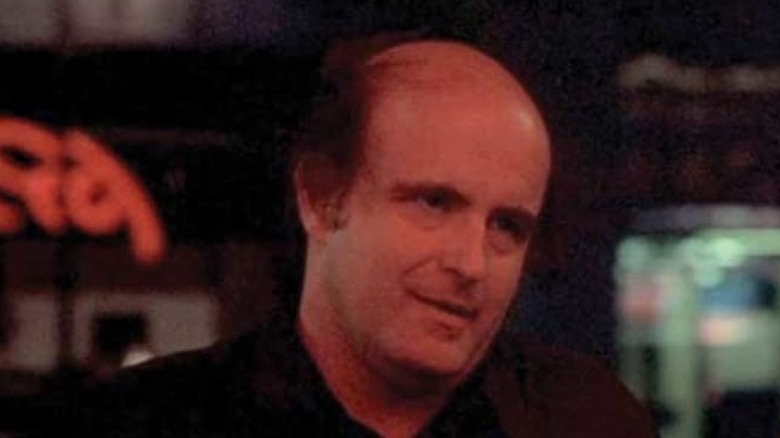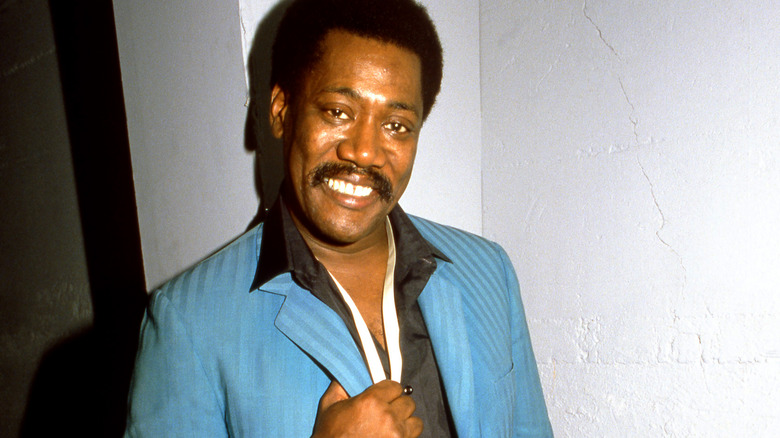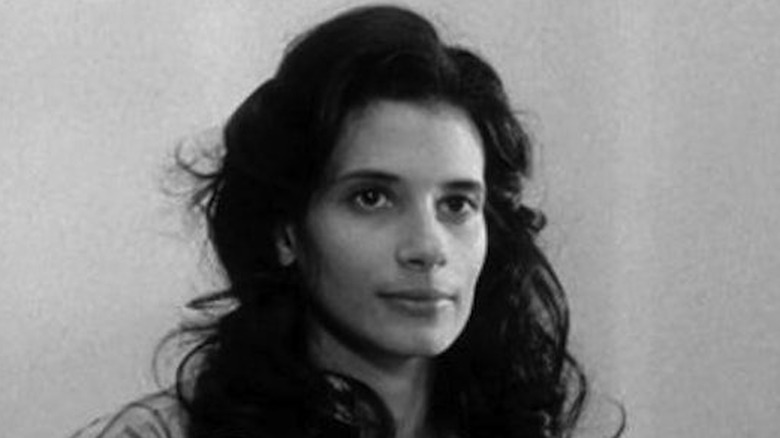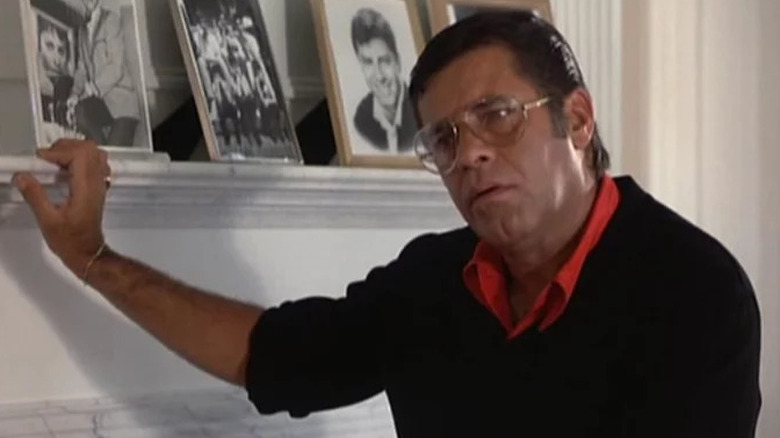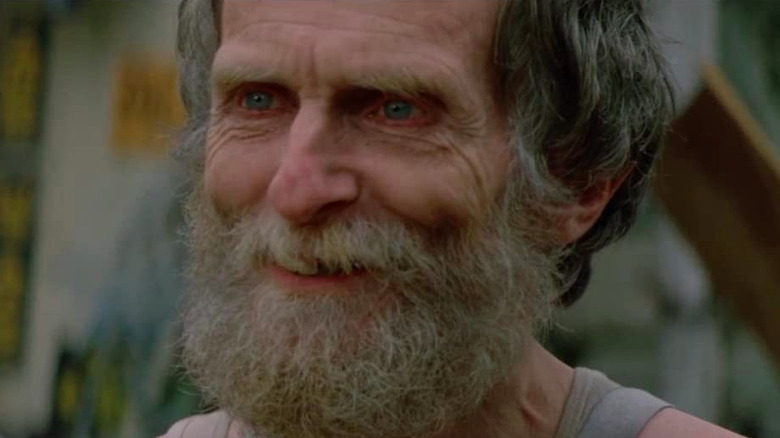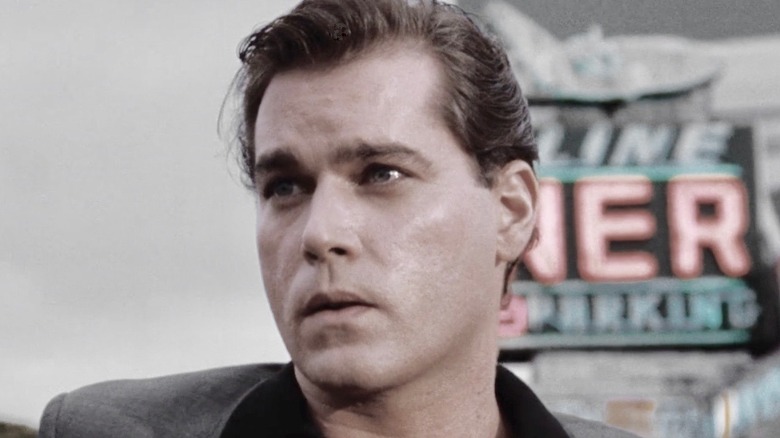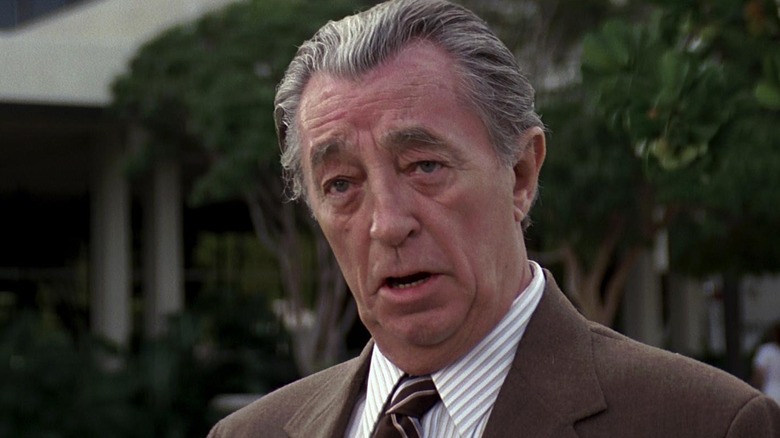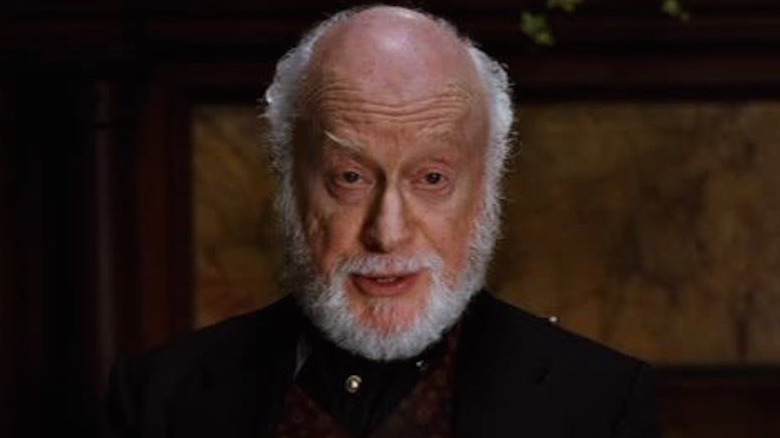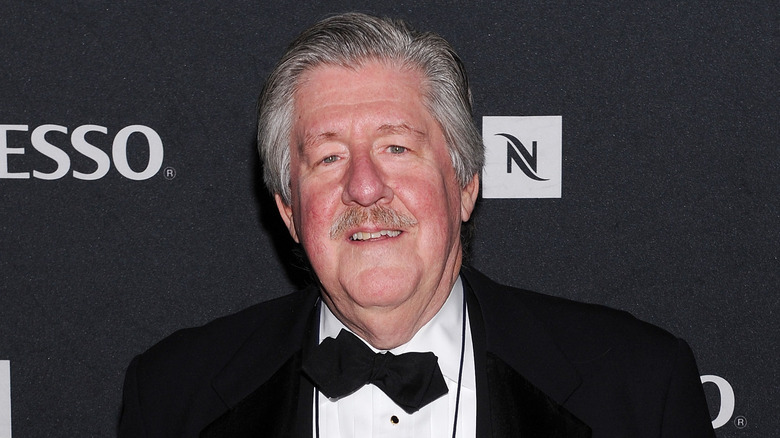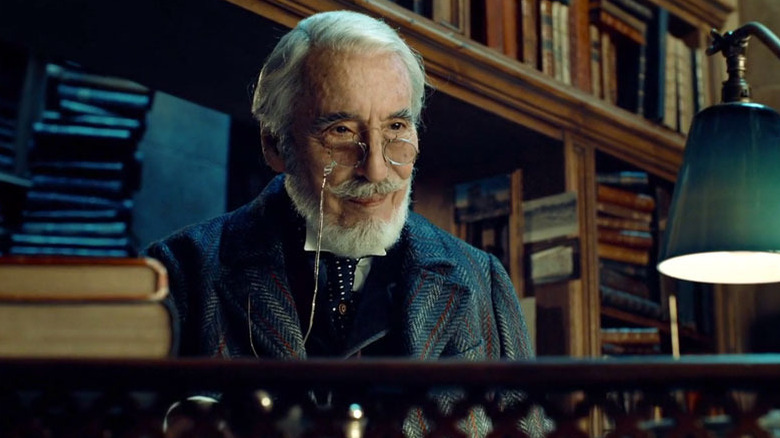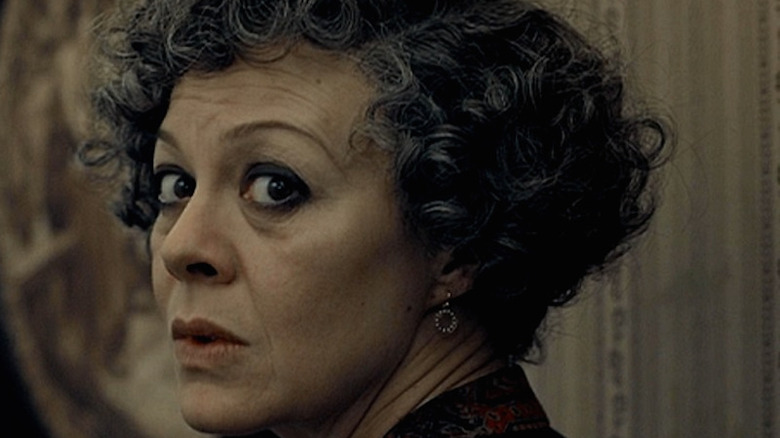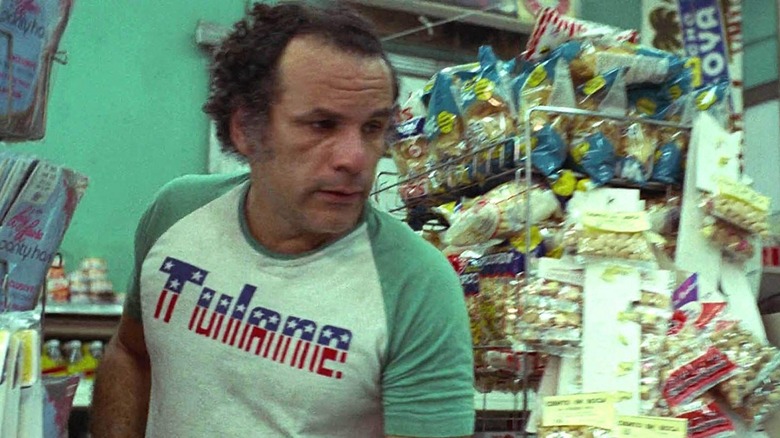Actors From Martin Scorsese Movies You May Not Know Passed Away
Actors want to work with Martin Scorsese for many reasons: the Oscar, Emmy, and Golden Globe winner is widely acknowledged as a master of his craft, having made such indelible films as "Taxi Driver," "Raging Bull," "Goodfellas," "The Wolf of Wall Street," and "The Irishman." Scorsese has worked with some of the most acclaimed actors of the past half-century, including regular contributors Robert De Niro, Leonardo DiCaprio, Joe Pesci, and Harvey Keitel, as well as Al Pacino, Jack Nicholson, Cate Blanchett, Margot Robbie, and Adam Driver, among many others.
But perhaps most importantly, Scorsese is known as a filmmaker who values actors' contributions to the filmmaking process. As DiCaprio told The New York Times in 2020, "He's always focused on what the actor gives, and that one-on-one dynamic. Plot to him is secondary. His focus is on finding the heart of the story through the actors that he works with." Scorsese himself echoes the sentiment: "I always say that casting is 85 to 90 percent of the picture for me," he said in 2021.
Dozens, if not hundreds of actors have worked with Scorsese since the release of his first feature film, "Who's That Knocking At My Door?" in 1967. He continues to collaborate with many of them; his upcoming historical drama "Killers of the Flower Moon" stars both De Niro and DiCaprio, his longest-running leading men.
As with any filmmaker whose career spans multiple decades, some of the stars Scorsese's camera has captured over the years have passed away, while others remain active. Here are a few faces worth remembering.
Zina Bethune was Scorsese's first female feature film star
Martin Scorsese's first film, "Who's That Knocking At My Door?" began as a 1965 student project with Harvey Keitel (in his screen debut) called "Bring on the Dancing Girls." A subplot involving a young woman with whom Keitel's character becomes involved was added in 1967 before additional footage and edits fleshed out the story to feature length. Actress and dancer Zina Bethune played Keitel's love interest, whose complicated past proves too difficult for his Catholic-influenced upbringing.
Bethune began performing at an early age — no small feat, given that as a child she had scoliosis, a condition that causes curvature of the spine. Despite this, she danced with the New York City Ballet by her teenage years, and began acting on Broadway and early television in the late 1950s. Bethune alternated guest roles on series like "Route 66" with series regular work on the daytime soap "The Nurses" before participating in Scorsese's student project.
After its completion and release, she returned to TV and later formed her own nonprofit dance company, Theater Bethune, which enrolled children with disabilities in dance-related projects. Five days before her 67th birthday, Bethune was driving in Los Angeles and exited her car to assist an injured animal by the side of the road. She was struck by oncoming traffic and died on February 12, 2012.
David Carradine played a Scorsese anti-hero
"Who's That Knocking On My Door" not only provided Scorsese with his first feature film, but also paved the way for his next project. Legendary producer Roger Corman saw Scorsese's film and hired him to direct a follow-up to his 1970 exploitation film "Bloody Mama," which co-starred a young Robert De Niro. Corman provided Scorsese with a 24-day shoot, $60,000 and permission to rewrite the script for what became 1972's "Boxcar Bertha," a Depression Era-drama about a Southern girl turned bank and train robber.
He also connected Scorsese with actor David Carradine — then a popular TV star thanks to "Kung Fu" — to star as "Big" Bill Shelley, a union organizer who joins Bertha (played by Carradine's then-girlfriend, Barbara Hershey) on her crime spree. Carradine would later reunite with Scorsese for a cameo in "Mean Streets," where his unnamed character is shot in the back by a young mobster-wannabe, played by Carradine's real-life brother, Robert.
Part of a family of actors that included his father John, brother Keith ("Deadwood"), half-brother Michael Bowen ("Breaking Bad"), and niece Martha Plimpton, David Carradine appeared in studio features and on episodic television before achieving widespread fame on "Kung Fu." Carradine's eccentric personality, counterculture leanings, and run-ins with the law took him out of the mainstream (where he had earned a Golden Globe and Emmy nomination) into low-budget features for Corman ("Death Race 2000") and Larry Cohen ("Q"). He enjoyed a brief career revival as Quentin Tarantino's evil final boss Bill in both volumes of "Kill Bill" before his death in 2009. Carradine was found dead in a hotel room in Thailand; the cause was attributed to asphyxiation.
Peter Boyle was the cabbie Wizard in Taxi Driver
In a pivotal scene in Scorsese's 1976 feature "Taxi Driver," Robert De Niro's Travis Bickle confesses to a veteran cabbie named Wizard that he has "some bad ideas" and an urge to do something drastic. Wizard listens to the younger man and attempts to pass along some advice about separating one's work life from their personal time. "Don't worry so much," says Wizard — but as viewers soon discover, those worries quickly turn Travis from a recluse to a violent, dangerous individual with delusions of heroism.
Peter Boyle, who played Wizard, was a popular character actor and occasional leading man in the 1970s, playing dramatic roles in films like John G. Avildsen's "Joe" and "The Candidate" while also displaying the comic skills he honed as a member of the Second City improvisational troupe as the monster in Mel Brooks' "Young Frankenstein." Boyle moved into television in the '80s and '90s, earning an Emmy for playing a psychic on "The X-Files" and netting eight additional Emmy nods as the gleefully cranky Frank Barone on "Everybody Loves Raymond."
The exposure from the latter series gave a boost to Boyle's screen career in the 2000s through films like "Monster's Ball" until his death from multiple myeloma, a blood cell cancer, on December 12, 2006. Boyle's wife, Lorraine Boyle, established a fund in her husband's name to support myeloma research.
Clarence Clemons jammed with Robert De Niro in New York, New York
Though forever enshrined as the saxophone player in Bruce Springsteen's E Street Band, musician Clarence Clemons recorded several solo albums and collaborated with dozens of other performers, including Lady Gaga, Aretha Franklin, Roy Orbison and Ronnie Spector. He also enjoyed a second career as an actor, including a brief appearance in Scorsese's 1977 film "New York, New York" as Cecil Powell, a trumpet player who sits in for a performance with Robert De Niro's self-centered saxophonist, Jimmy Doyle.
"New York, New York" was Clemons' first turn as an actor, but in the 1980s and 1990s, he was a frequent guest star on television series like "Diff'rent Strokes" and "Nash Bridges." Though most of his screen roles, including a stint as narrator on the Season 11 "Simpsons" episode "Grift of the Magi," were light-hearted, he proved to be a capable dramatic actor in two episodes of "The Wire," for which he played a Baltimore youth program coordinator. Clemons had fewer feature film appearances, though he did play One of the Three Most Important People in the World (opposite fellow musicians Martha Davis and Fee Waybill) in "Bill and Ted's Excellent Adventure." Clemons suffered a massive stroke in June of 2011 and died of complications at the age of 69 on June 18 of that year.
Raging Bull's Theresa Saldana became an advocate for crime victims
Though Theresa Saldana enjoyed a long career in features and on television, her acting roles, which included playing Joe Pesci's wife in Scorsese's "Raging Bull," were overshadowed by an incident of real-life violence that nearly left her dead.
Saldana rose to fame as a Beatles fan in the Robert Zemeckis film "I Wanna Hold Your Hand" before playing Lenora LaMotta, who endures seeing her husband Joey (Pesci) assaulted at the hands of his own brother Jake LaMotta (played by Robert De Niro) in "Raging Bull." Two years after the film's release, Saldana was assaulted by a deranged admirer in front of her home in West Hollywood, California; the attacker obtained her personal information through a private investigator and even spoke to Saldana's mother in order to gain her address.
After four months of recovery, Saldana returned to acting, playing herself in the 1984 TV-movie "Victims for Victims: The Theresa Saldana Story" and earning an Golden Globe nomination as the wife of Michael Chiklis on "The Commish." She also became a dedicated activist, founding the Victims for Victims support organization and lobbying for anti-stalking legislation in 1990 and a 1994 drivers' privacy act, both of which passed into law. She continued to act on television until 2004; a hospitalization for pneumonia preceded her death at the age of 61 on June 6, 2016.
Hollywood legend Jerry Lewis went dramatic for King of Comedy
"The King of Comedy," Scorsese's darkly comic 1982 meditation on the perils of fame, pitted Robert De Niro's psychotic Rupert Pupkin — a would-be stand-up comic — against his idol, talk show host Jerry Langford. Adding to the surreal quality of the film is the presence of comedian/filmmaker Jerry Lewis, who plays the role with a mostly straight face.
Lewis took the dramatic route on several occasions during his long career – episodes of "Wiseguy" and "Law & Order: Special Victims Unit," and his own infamous, still-unreleased Holocaust film "The Day the Clown Cried" — but "King of Comedy" gave Lewis a feature-length showcase for his talents outside of his extreme physical comedy, and he depicted Langford's dismay with skill. Decades later, the film would receive a quasi-comic book tribute via "Joker," whose look and feel was largely inspired by Scorsese's film.
One of the most celebrated comic actors of the 20th century, Lewis was both a solo star and part of a hugely popular duo act with singer/actor Dean Martin. At the height of their fame in the late 1950s, Lewis broke away to take control of his anarchic comic presence in a series of broadly slapstick but carefully constructed features, including "The Nutty Professor" and the remarkable, largely silent film "The Bellboy." These screen comedies influenced generations of comics to come, from Steve Martin and Jim Carrey to Adam Sandler, while his directorial career introduced video assist, a closed-circuit monitor set that allowed directors to see footage prior to development, and which remains an industry standard today.
Lewis was also the highly visible face of the Muscular Dystrophy Association, and hosted its annual fundraising telethon from 1966 to 2010. The recipient of an Oscar (the Jean Hersholt Humanitarian Award), Emmy (Governor's Award), and Golden Lion (Career Award) from the Venice Film Festival, Lewis was also a controversial figure who spoke disparagingly about female comics and after his death was accused of sexual misconduct by several co-stars. He died at his home in Las Vegas, Nevada on August 20, 2017 at the age of 91.
The Last Temptation of Christ added another unique character to Roberts Blossom's resume
The eclectic cast of Scorsese's 1987 adaptation of "The Last Temptation of Christ" included Harry Dean Stanton, David Bowie, directors Irvin Kershner ("The Empire Strikes Back") and Steve Shill, and musicians John Lurie and Michael Been, among others. A familiar face, if not name, also popped up briefly as an elderly man at a monastery visited by Jesus (Willem Dafoe) where a funeral for an equally venerable master took place. The master, who was described as having completed his life's work, foreshadows the vision Jesus has of his life if he not been deemed the Messiah.
Character actor Roberts Blossom, who played the aged Master in "Christ," was perhaps best known as the lonely Old Man Marley in "Home Alone," but also enjoyed a long career in features and on stage and television. A veteran of World War II, Blossom worked as a therapist before landing roles in multiple theater productions in the 1960s. Television and films soon followed, for which the tall, rangy Blossom invariably played intense men who were years or even decades beyond his actual age, including the inmate who cut off his fingers to defy a prison warden in "Escape from Alcatraz," and the sinister owner of the titular car in John Carpenter's "Christine." His most alarming screen role, however, was as a mother-fixated psychopath in "Deranged," inspired by the crimes of real-life serial killer Ed Gein.
Films like "Home Alone" and series like "Amazing Stories" and "Northern Exposure," meanwhile, showcased Blossom's versatility in gentler roles. Blossom retired from acting after his turn in Sam Raimi's 1995 Western "The Quick and the Dead," devoting his time to poetry. He died at the age of 87 on July 8, 2011 from cerebrovascular disease.
Ray Liotta shot to stardom in Goodfellas
Among the actors considered for the role of mob-soldier-turned-informant Henry Hill in Scorsese's "Goodfellas" were Tom Cruise, Sean Penn, and Alec Baldwin. However, Ray Liotta, at the time a relative unknown, became the contender after Robert De Niro saw his harrowing performance as Melanie Griffith's psychotic husband in Jonathan Demme's "Something Wild." To prepare for his performance, Liotta listened to the FBI's audio recordings of Hill in order to capture his matter-of-fact delivery and accent.
Though perhaps best known for rough-hewn, hot-wired types like Hill and for films like "No Sudden Move," "Narc," and "The Many Saints of Newark," Liotta played a diverse array of characters throughout his long film and television career. As he told the Long Island Weekly in 2018, "I've done movies with the Muppets. I did Sinatra .... I did a movie with an elephant," referencing "Muppets Most Wanted," the HBO TV-movie "The Rat Pack," and "Operation Dumbo Drop." Liotta, who won a Golden Globe for "Something Wild," also netted an Emmy as an alcoholic ex-con on an episode of "ER" that unfolded in real time. Other outside-the-box turns for Liotta include a flashy divorce lawyer in "Marriage Story" (which earned the cast an Independent Spirit Award), an unctuous FBI chief in "Hannibal," a dirty police officer in "Cop Land," and a survivor of the Alamo in the miniseries "Texas Rising."
Liotta worked at a breathless pace for decades, moving between features, TV series like "Shades of Blue," episodic guest shots, and even voice-over performances for animated projects and video games ("Grand Theft Auto: Vice City"). At the time of his death at the age of 67 on May 26, 2022, Liotta had at least five posthumous films in various states of completion, including Elizabeth Banks' "Cocaine Bear."
Cape Fear's original villain, Robert Mitchum, returned for the remake
When Scorsese decided to remake the 1962 thriller "Cape Fear" in 1991, he paid homage to the original film in a number of ways. Chief among these was his use of composer Bernard Herrmann's chilling score, but Scorsese also tapped three of the original film's stars to play minor roles in his version. Oscar winner Gregory Peck, who played lawyer Sam Bowden, protecting his family from vengeful ex-con Max Cady, played the obsequious jailhouse lawyer who helped to free Robert De Niro's Cady in the remake; presiding over the trial was fellow Oscar winner Martin Balsam, who played police lieutenant Mark Dutton in J. Lee Thompson's film.
Actor Robert Mitchum, whose performance as Max Cady in the 1962 "Cape Fear" ranked in the Top 30 of the American Film Institute's 100 Heroes & Villains poll, played the sympathetic but cagey Lt. Elgart, who realized that attempts to scare off Cady with legal threats were useless. A memorable presence in films from the 1940s through the 1990s, Mitchum radiated effortless cool in a wide variety of projects, from classic noir like "Out of the Past" to epic miniseries like "The Winds of War." No matter what the role required — an Australian accent in "The Sundowners," religious (and homicidal) mania in Charles Laughton's classic chiller "Night of the Hunter," or light comedy as an alcoholic gunfighter in "El Dorado" — Mitchum always delivered while also managing to seem as if the task was no big deal.
A roguish presence off-screen — he famously recorded an album of calypso music in 1957, and essentially laughed off 43 days in prison for possession of marijuana in 1948 — Mitchum remained active in features and on TV into the 1990s, with roles in Jim Jarmusch's "Dead Man" and the Family Channel series "African Skies." A heavy smoker throughout his life, Mitchum died of emphysema and lung cancer shortly before his 80th birthday on July 1, 1997.
The Age of Innocence was just one part of Norman Lloyd's long career
At the heart of Scorsese's 1993 adaptation of Edith Wharton's novel "The Age of Innocence" was the stifling atmosphere of 19th century New York, where societal rules of etiquette prevent its characters from expressing their true feelings. Wharton used a love triangle to illustrate the situation, with lawyer Newland Archer (Daniel Day-Lewis) falling hopelessly in love with divorced American countess Michelle Pfeiffer yet unable to act on his feelings due to his engagement to her cousin (Winona Ryder).
In Scorsese's film as well, Archer is thrust into the situation against his will by his employer, Mr. Letterblair, who was played by veteran actor and producer Norman Lloyd. Though perhaps best known to modern audiences for his long run as Dr. Auschlander on "St. Elsewhere," Lloyd's career reaches back to the 1930s, when he was a member of such esteemed stage companies as the Federal Theatre Project and the Mercury Theatre, co-founded by Orson Welles. Appearances in Alfred Hitchcock's "Saboteur" and "Spellbound" led to a stint as director and associate producer of the filmmaker's anthology series "Alfred Hitchcock Presents." Lloyd continued to act, produce and direct into his ninth decade, amassing credits that ranged from "Dead Poets Society" and "The Practice" to the Amy Schumer comedy "Trainwreck." In 2007, his long and storied career was the subject of a documentary, "Who is Norman Lloyd?"
After contributing to documentaries on Buster Keaton and Broadway in 2018 and 2021 respectively, Lloyd died at the age of 106 on May 11, 2021.
Edward Herrmann took part in two Scorsese films
"The Aviator," Scorsese's 2004 biopic of industrialist/filmmaker Howard Hughes, was front-loaded with major talent in virtually every role, from Leonardo DiCaprio as Hughes to supporting and minor roles played by Jude Law, Ian Holm, Gwen Stefani, Brent Spiner, and Frances Conroy. Also appearing briefly in the film is Emmy- and Tony-winning actor Edward Herrmann, who plays Joseph Breen, the head of the Production Code Administration, which censored content for motion pictures, including Hughes' notorious Western "The Outlaw." Herrmann later reunited with Scorsese on "The Wolf of Wall Street," lending his measured tones to a television commercial for the fictitious brokerage firm Stratton Oakmont.
Herrmann may be best remembered as Lorelai Gilmore's patrician father, Richard Gilmore, on "Gilmore Girls," but the actor had a long list of film and television credits reaching back to the early 1970s. He began his career on stage before his big break in the miniseries "Eleanor and Franklin," for which he earned an Emmy nomination as President Franklin D. Roosevelt. Herrmann's turn as FDR largely cemented his screen image as well-to-do authority figures: he reprised FDR for the 1982 movie version of "Annie" and played well-heeled, slightly stuffy figures in films ranging from "Overboard" and "Richie Rich" to Peter Bogdanovich's "The Cat's Meow." A notable exception to this list was as Max, the kindly video storeowner with a terrible secret in "The Lost Boys."
Herrmann also lent his voice to numerous television commercials and documentaries, including Ken Burns' "The Roosevelts: An Intimate Series" and "Cancer: The Emperor of All Maladies." The latter project was also Herrmann's final credit; the actor, who was himself suffering from brain cancer, died of the disease at the age of 71 on December 31, 2014.
Horror great Christopher Lee played nice in Hugo
Though he received relatively brief screen time in "Hugo," Scorsese's 2011 adaptation of Brian Selznick's novel "The Invention of Hugo Cabret," Monsieur Labisse was a crucial component of the film's central mystery. A bookseller by trade, Labisse is kind to the film's female protagonist Isabelle (Chloe Grace Moretz), lending her books that help her understand the world around her. He later directs Isabelle and her orphan friend Hugo (Asa Butterfield) to the Film Academy Library when they suspect that Isabelle's godfather, Georges (Ben Kingsley) is really the silent film pioneer Georges Melies.
Playing Monsieur Labisse was legendary British actor Sir Christopher Lee, who at the time of the "Hugo" release was enjoying a surge of popularity even greater than his tenure at England's Hammer Films in the 1960s, when he played virtually every movie monster imaginable, including the Frankenstein monster, Dracula, and the Mummy. A magnetic presence due to his considerable height (6'5") and sepulchral voice, Lee became the go-to-actor for horror and suspense for decades, often in partnership with his friend, actor Peter Cushing. However, he chafed under such typecasting and headed for Hollywood in the 1970s, where he stood out in films like "1941" and "The Man with the Golden Gun."
A generation of filmmakers who grew up with Lee's performances for Hammer and in films like "The Wicker Man" were delighted by the opportunity to cast such him in their own films during the new millennium. As such, a pair of blockbuster franchises — Peter Jackson's "Lord of the Rings" trilogy and George Lucas's prequels to "Star Wars" — introduced Lee to a whole new audience. An astonishingly prolific actor with hundreds of film credits, Lee remained active until 2015 while also enjoying a surprising second career as a heavy metal recording artist; the 93-year-old Lee died of respiratory problems and heart failure on June 7, 2015.
Peaky Blinders and Harry Potter star Helen McCrory also starred in Hugo
In Scorsese's "Hugo," Mama Jeanne (played by Helen McCrory) is the kindly spouse of Ben Kingsley's toy store owner Georges — and like her husband, she has a remarkable secret. Jeanne is actually Jehanne d'Alcy, a real-life French actress who not only appeared in the silent fantasy films of director Georges Melies, but was also his wife until his death in 1938. Jehanne appeared in many of Melies' most influential films, including "A Voyage to the Moon."
Like d'Alcy, Helen McCrory began her career on the London stage before progressing into films and television. She made her screen debut with a minor role in "Interview with the Vampire," and soon moved up to supporting characters in major UK film projects like "Charlotte Grey" and "The Count of Monte Cristo" with Guy Pearce. A turn as Prime Minister Tony Blair's wife Cherie in "The Queen," preceded her debut as Narcissa Malfoy in "Harry Potter and the Half-Blood Prince" (which she reprised in both parts of "The Deathly Hallows"), and high-profile projects like "Peaky Blinders."
McCrory also turned up in the James Bond adventure "Skyfall" and lent her voice to "Fantastic Mr. Fox," "His Dark Materials" and "Charlotte." The latter animated project proved to be her final screen role; her husband, actor Damien Lewis ("Billions") announced via social media that McCrory had died of breast cancer at the age of 52 on April 16, 2021.
Victor Argo was one of Scorsese's go-to actors
In addition to his regular leads (De Niro, DiCaprio, Keitel), Scorsese also tapped a small pool of supporting players to appear in many of his projects. Among them are actor Harry Northrup, who appeared in six Scorsese films, as well as Illeana Douglas and J.C. MacKenzie, who each have four Scorsese film credits.
One of Scorsese's earliest regular collaborators was actor Victor Argo, who appeared in small but notable roles in "Boxcar Bertha," "Mean Streets," and "Taxi Driver." After a gap of about a decade, Argo reunited with Scorsese for "After Hours" and "The Last Temptation of Christ" (as the apostle Peter), as well as the "Life Lessons" segment of the anthology film "New York Stories."
Argo was a familiar face to filmgoers for more than three decades, thanks to character roles in dozens of Hollywood and indie features. Director Abel Ferrara featured him in a number of his projects, including "King of New York" and "Bad Lieutenant," as did Woody Allen, who tapped Argo for "Crimes and Misdemeanors" and "Shadows and Fog." Argo played his share of tough guys in films like "Raw Deal" and "True Romance," but he was also adept at sympathetic types in Paul Auster and Wayne Wang's "Smoke" and "Blue in the Face," as well as "Angel Eyes," which cast him as Jennifer Lopez's father.
Argo died on April 7, 2004 from complications of lung cancer. Scorsese filmed a short tribute to Argo that aired at a memorial for the actor; his description of Argo as a wise and dependable soul was echoed by many of his fans, and by admirers like author and film historian Richard Harland Smith.
"Vic rarely did better than seventh or eighth billing in the movies but offscreen he was a star," Smith told Looper in regards to his friend. "He had a huge following in the New York theatre world, he was absolutely adored. He was generous with his company and his time. He loved to work, to workshop new stuff, even if he wouldn't get paid for it, and he loved to encourage underrepresented talent. He made us all feel important."
